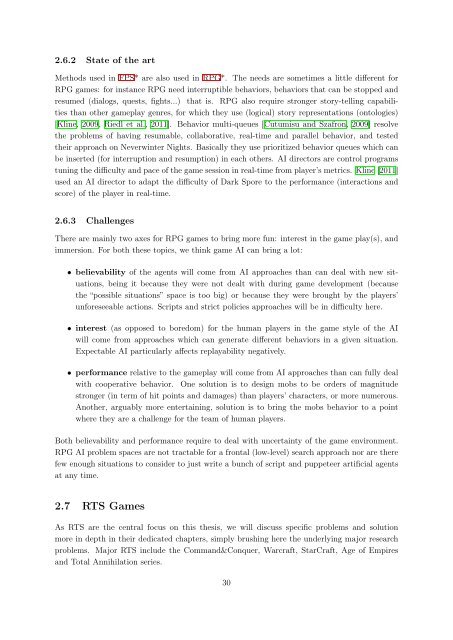Bayesian Programming and Learning for Multi-Player Video Games ...
Bayesian Programming and Learning for Multi-Player Video Games ...
Bayesian Programming and Learning for Multi-Player Video Games ...
You also want an ePaper? Increase the reach of your titles
YUMPU automatically turns print PDFs into web optimized ePapers that Google loves.
2.6.2 State of the art<br />
Methods used in FPS* are also used in RPG*. The needs are sometimes a little different <strong>for</strong><br />
RPG games: <strong>for</strong> instance RPG need interruptible behaviors, behaviors that can be stopped <strong>and</strong><br />
resumed (dialogs, quests, fights...) that is. RPG also require stronger story-telling capabilities<br />
than other gameplay genres, <strong>for</strong> which they use (logical) story representations (ontologies)<br />
[Kline, 2009, Riedl et al., 2011]. Behavior multi-queues [Cutumisu <strong>and</strong> Szafron, 2009] resolve<br />
the problems of having resumable, collaborative, real-time <strong>and</strong> parallel behavior, <strong>and</strong> tested<br />
their approach on Neverwinter Nights. Basically they use prioritized behavior queues which can<br />
be inserted (<strong>for</strong> interruption <strong>and</strong> resumption) in each others. AI directors are control programs<br />
tuning the difficulty <strong>and</strong> pace of the game session in real-time from player’s metrics. Kline [2011]<br />
used an AI director to adapt the difficulty of Dark Spore to the per<strong>for</strong>mance (interactions <strong>and</strong><br />
score) of the player in real-time.<br />
2.6.3 Challenges<br />
There are mainly two axes <strong>for</strong> RPG games to bring more fun: interest in the game play(s), <strong>and</strong><br />
immersion. For both these topics, we think game AI can bring a lot:<br />
• believability of the agents will come from AI approaches than can deal with new situations,<br />
being it because they were not dealt with during game development (because<br />
the “possible situations” space is too big) or because they were brought by the players’<br />
un<strong>for</strong>eseeable actions. Scripts <strong>and</strong> strict policies approaches will be in difficulty here.<br />
• interest (as opposed to boredom) <strong>for</strong> the human players in the game style of the AI<br />
will come from approaches which can generate different behaviors in a given situation.<br />
Expectable AI particularly affects replayability negatively.<br />
• per<strong>for</strong>mance relative to the gameplay will come from AI approaches than can fully deal<br />
with cooperative behavior. One solution is to design mobs to be orders of magnitude<br />
stronger (in term of hit points <strong>and</strong> damages) than players’ characters, or more numerous.<br />
Another, arguably more entertaining, solution is to bring the mobs behavior to a point<br />
where they are a challenge <strong>for</strong> the team of human players.<br />
Both believability <strong>and</strong> per<strong>for</strong>mance require to deal with uncertainty of the game environment.<br />
RPG AI problem spaces are not tractable <strong>for</strong> a frontal (low-level) search approach nor are there<br />
few enough situations to consider to just write a bunch of script <strong>and</strong> puppeteer artificial agents<br />
at any time.<br />
2.7 RTS <strong>Games</strong><br />
As RTS are the central focus on this thesis, we will discuss specific problems <strong>and</strong> solution<br />
more in depth in their dedicated chapters, simply brushing here the underlying major research<br />
problems. Major RTS include the Comm<strong>and</strong>&Conquer, Warcraft, StarCraft, Age of Empires<br />
<strong>and</strong> Total Annihilation series.<br />
30


